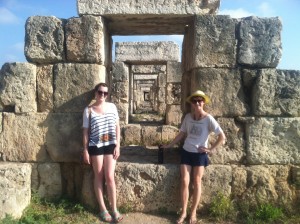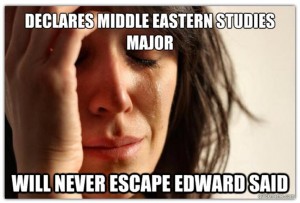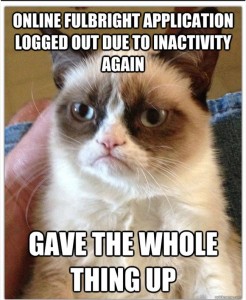Lately, what with all the personal statements for fellowships, thesis planning, and suddenly turning into a senior and (supposedly) oldest and wisest of students, I’ve been thinking about the trajectory of my academic and career interests over the last four plus years. How did I arrive where I am today? Plans and interests will keep morphing, likely narrowing, but for now it’s pretty satisfying to look back and be able to trace a thread through my activities, interests, and classes dating relatively far back. I think this is probably true for most of us. For periods of time, I may not have seen what path I was on, but looking back it seems surprisingly coordinated. Hopefully giving you a picture of this trajectory will provide good background for future blog posts.
Growing up, I learned about practices and tenets of different faith traditions including Christianity, Islam, Buddhism, and Hinduism. My family celebrated Christmas, Hanukah, and winter and summer solstice every year, and I fully observed Ramadan in 10th grade. We have a number of Muslim Sufis family friends who are scholars of Arabic, Arab poetry and politics, and the like. I have no doubt that all this influenced where I’ve ended up interest-wise and academically, as a Middle Eastern Studies and Religious Studies dual major taking Arabic.
When I was 12 I started attending youth Vipassana meditation retreats. Six years of these and the resulting meditation practice have deeply affected my outlook on and method of living life. In addition, I grew to delight in hearing about others’ beliefs, life philosophies, and personal thoughts on religion, especially those of people near my age. A regular fixture of the retreats were discussion groups, where we shared and and unpacked each others’ beliefs, worries, and life experiences in small groups. Since, I feel I’ve carved out an area of study that incorporates this interest in others’ relationships with religion into the more theoretical fields of anthropology, ethics, and religious studies.
Since, I’ve become a Middle Eastern Studies and Religious Studies dual major. My concentration within Religious Studies is Middle Eastern Studies, Islam being the faith I focus on most closely. Some of my favorite classes focusing on Islam include Islam versus Islam with Professor Alwishah at Pitzer and Mysticism and the Great Traditions and Islam and Democracy during my semester abroad at the School of Oriental and African Studies (SOAS) in London (check it out as a great possibility for those of you interested in studying abroad in the UK and focusing on regional or language studies). I took several years of fusHa, Modern Standard or media Arabic at CMC then segued into independent studies covering specific Arabic dialects. Last semester I created a class with Arabic Professor Ramadan and another friend focusing on Levantine Arabic. This semester, I meet once a week with a Lebanese CMC professor and several other students to speak and improve our Lebanese dialect specifically.
I took at CORE III called “What is Happiness?” about ethics, happiness, religion, and psychology, which led me with help from Aristotle, Marcus Aurelius, and the Dalai Lama to clarify much of my personal philosophy on life. Religion, Ethics, and Social Practice junior year at Pomona brought me again to look at personal thoughts and struggles around religion and life philosophy, both mine and others’. Sharing personal stories and reflections on social justice issues got me turned on again to hearing other people’s stories. Presently I am taking Jerusalem: the Holy City in alignment with my focus on religion and the Levant area of the Middle East as well as an Anthropology seminar on Sexuality and Religion, focusing on Islam and Christianity.
This summer, I interned in Beirut and started a part of my thesis research interviewing 20 young people between the ages of 18 and 25 who had lived in Beirut for much or all of their lives. I interviewed mostly Lebanese, but also Palestinians, Syrians, Fijians, and Sudanese of all different sects about their relationships with and feelings around their sectarian and religious identities. These interviews were especially interesting for me considering the way religion is ever present and relevant in Lebanon, and what’s been going on in the Levant region for the last several years. I not only got to conduct first-hand research on a topic that fascinates me and in the region I have been specializing in and hope to work in, but also affirmed the idea that I enjoy ethnographic research and may apply for a graduate program in Religious or Middle Eastern Anthropology within the few years. Additionally, I got to work on improving my spoken Arabic (both Lebanese and Palestinian dialects). If you’re interested in learning more about different Arabic dialects, or if you’re not sure where the Levant region really is in the Middle East, check out this Wikipedia page. I like the map, but don’t forget to take it with a grain of salt.
I sort of did my thesis research backwards. As my advisor told me a few days ago, I have research but I don’t necessarily have a framework. What I’m working on now is reading scholar’s works on youth and sectarianism in the Levant and in Lebanon, as well as looking further into topics or events that were referenced by my interviewees this summer. Key topics and patterns that came up in many interviews include changing perception of the divine, the idea, even among the relatively devout, that all Abrahamic traditions essentially land you in the same place, colonization, language and religion, and hopes for the future of sectarianism and politics in Lebanon. There’s nothing I would rather study. For now, it looks like my thesis will likely be focused on shifting perception of sect and personal religious identity among young people in Beirut or the Levant, based at least in part on my interviews.
How is everyone feeling about thesis? When and how did you decide where your interests lie academically? Can you see how your interests led you to your current point or do you feel like your path is still forming?

My friend Carly and me at Roman and Byzantine ruins in Sur, southern Lebanon. My friend Walid, who was also with us, happened to be distantly related to the soldier guarding the ruins so he gave us a very detailed private tour.




